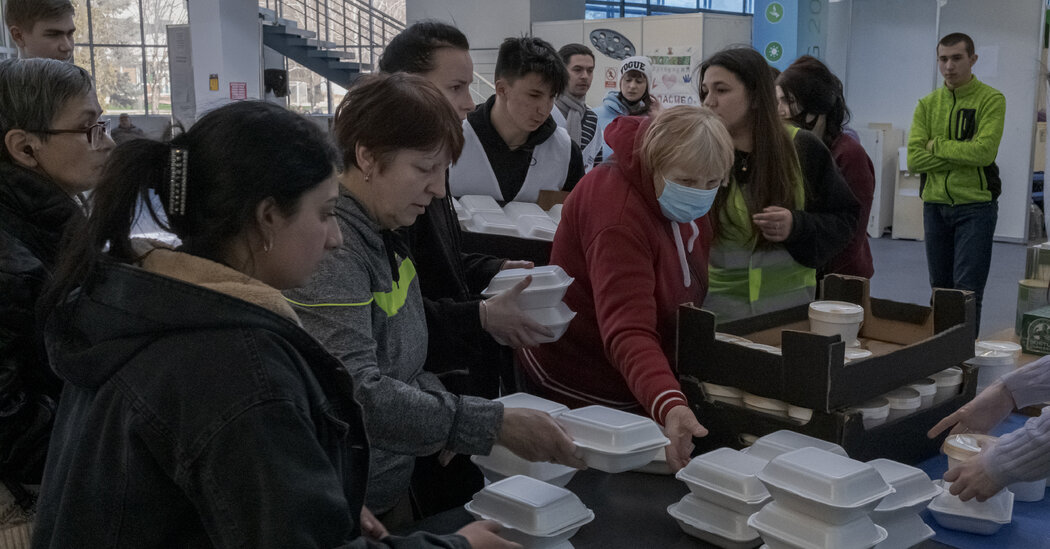
MYKOLAIV, Ukraine — The headquarters of the 36th Ukrainian Naval Infantry Brigade based in the southern city of Mykolaiv is no more. It is now a pile of rubble, where on Saturday rescuers continued to search for bodies of missing marines.
An early morning rocket attack a day earlier destroyed the base’s barracks where an unknown number of marines were sleeping. It killed as many as 40 marines, according to a senior Ukrainian military official, who spoke on condition of anonymity to reveal sensitive military information.
That number would make it one of the single deadliest attacks on Ukrainian forces since the start of the war three weeks ago. But there are indications that the death toll could be much higher.
All day on Saturday, vans and trucks with homemade signs saying “Load 200,” the code for military deaths, came in and out of the base’s front gates. Inside, exhausted looking fire fighters scrambled over a pile of broken concrete and rebar in search of survivors.
At the Mykolaiv city morgue, dozens of bodies, some in uniform, were laid out side by side in a storage area. A morgue employee would not say how many had been newly brought from site of the destroyed barracks.
“Many,” he said. “I won’t say how many, but many.”
The Russian attack was a blow to this city, which had been enjoying a period of relative quiet after weeks of heavy shelling. Ukrainian forces had pushed back Russian troops beyond the range of their artillery.
The senior Ukrainian official said it was likely that the barracks had been hit by a longer-range weapon, like an Iskander-M ballistic missile, though Ukrainian authorities have released few other details.
The governor of the Mykolaiv Region, Vitaliy Kim, who has become known for his upbeat daily video messages, appeared somber on Saturday.
Russian forces, he said, “dishonorably fired rockets at our sleeping soldiers yesterday.”
“The rescue operation is still ongoing,” he said. “I don’t want to talk about it because I’m awaiting official conclusions of the Ukrainian armed forces.”
In a Facebook post on Friday, the 36th Brigade did not mention the attack, but published a video montage of the marines in action, accompanied by a patriotic song. The post said that several of those in the video had “died a glorious death in the field of battle, never having heard the words sung in their honor.”
For weeks, Russian forces have been massed on the outskirts of Mykolaiv, attempting to surround and capture the city and seize control of the only bridge across the Southern Buh River, which would allow them to move toward Odessa and the headquarters of the Ukrainian Navy.
The Ukrainian military’s defenses in Mykolaiv have so far held, though not without losses. Dozens of civilians have been killed in shelling, often with cluster munitions. A cruise missile attack on the barracks of the 79th Ukrainian Air Assault Brigade this month killed about 10 soldiers, Ukrainian officials said.
Despite the attack Friday, Ukrainian military officials were upbeat about their efforts to push the Russian lines farther east, away from the city.
At a fortified Ukrainian position outside Mykolaiv on Saturday, soldiers appeared relaxed, smoking and chatting in small groups outside their trenches. Volunteers brought them jars of homemade borscht for lunch.
“They don’t have the forces to attack Mykolaiv now,” said Lt. Col. Yaroslav Chepurnoi, of the 79th Ukrainian Air Assault Brigade, which was deployed to that position. “But they seem to be preparing something. They’ve started to dig in around different population centers, and with quick raids we have gradually started to push them out of these places. That’s how the war is going right now.”
The spoils of war were visible on the road. A large military transport truck emblazoned with the white Z that Russian forces use to identify themselves was being towed into town. A half-destroyed armored Tigr fighting vehicle, Russia’s answer to the Humvee, was sitting on a flatbed truck.
Because of the lull in shooting, workers from local construction companies were out on Saturday helping to build new trenches and an underground shelter compete with a wood-burning stove.
One sergeant, who would give only his first name, Andrei, said he left work as a security guard and went to the local draft office the day Russia’s president, Vladimir V. Putin, ordered his forces to invade Ukraine. He has been living in a trench ever since.
He said the attack on the marine base showed the need for western countries to provide Ukraine with additional missile defense systems. Despite the large loss of life in that attack, he said he thought Russian forces were now on their back foot.
“We’re holding the defense and waiting for them to weaken,” he said. “In my opinion we should get an order to cleanse them to zero. But that’s just my opinion. I’m a soldier.”
Part of the Ukrainian military’s success, the sergeant said, was the assistance it has received from local residents. In addition to the borscht, he said, locals brought him a new cellphone so that they could more easily provide him with information about Russian troop movements in their villages.
“They thought that the locals would meet them with flowers,” he said, throwing in several unprintable words. “And the locals told them, we don’t need your Russian world, so go back to where you come from.”




